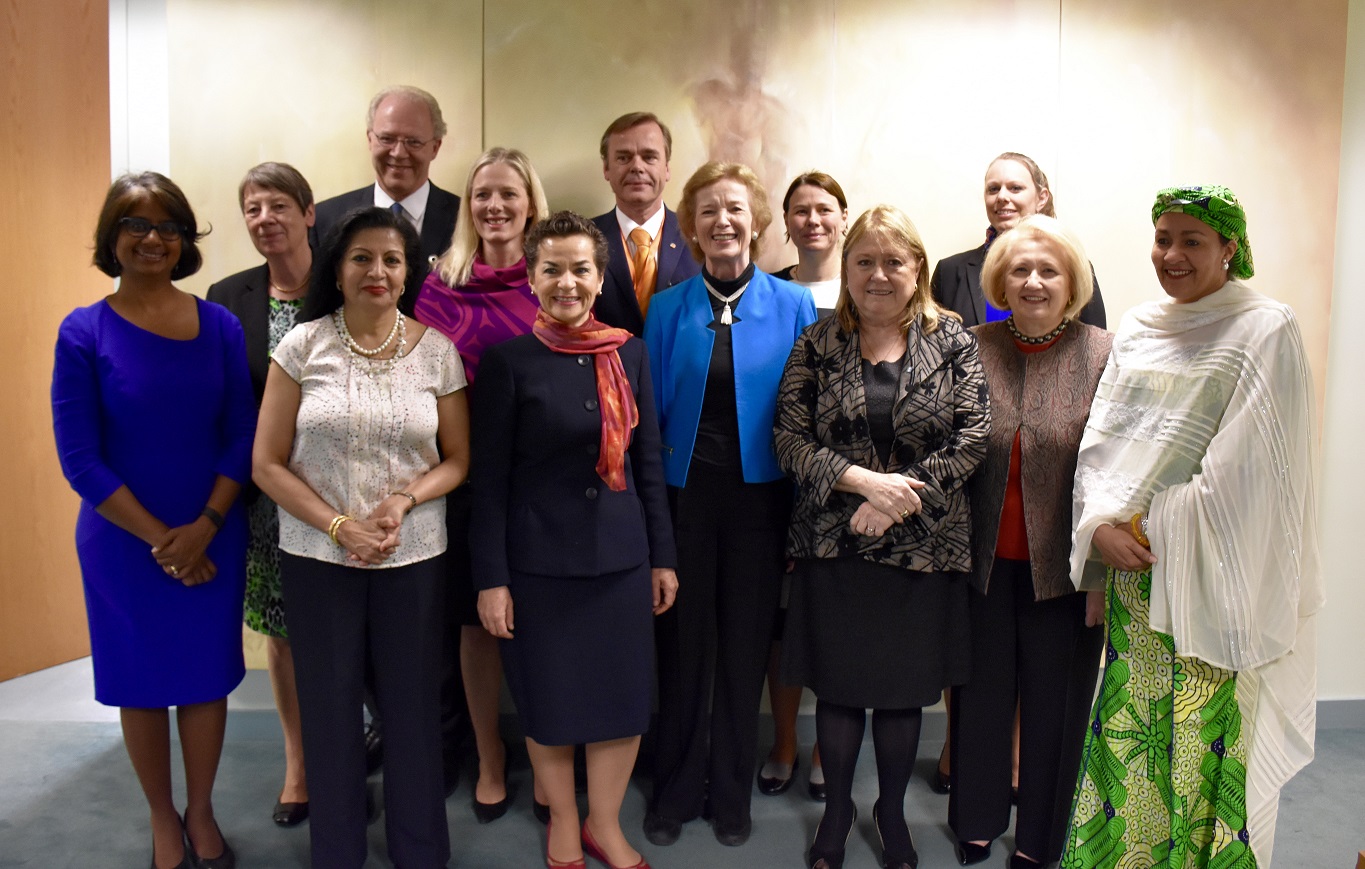On the morning of the historic signing of the Paris Agreement on April 22nd, women leaders gathered to discuss how they can support progress to ensure gender responsive climate action.
The meeting of the Troika+ of Women Leaders on Gender and Climate Change explored options for advancing the goal of gender balance under the UNFCCC, promoting gender responsive climate policy and enabling grassroots women’s participation in the reviews scheduled for Decisions 23/CP.18 and 18/CP.20 in Morocco.
Mary Robinson who chaired the meeting that was attended by 18 women leaders on climate action including six government Ministers, began by acknowledging the leadership of Troika+ member Christiana Figueres, Executive Director of the UNFCCC in negotiating the Paris Agreement.
Mary Robinson then welcomed new Troika+ members Minister Catherine McKenna, Minister of Environment and Climate Change, Canada, Minister Amina Mohammed, Minister of the Environment, Nigeria and Susana Malcorra, Minister of Foreign Relations from Argentina before introducing the discussion questions for the group:
- What are the obstacles to achieving the goal of gender balance in national delegations and in bodies constituted under the UNFCCC and what actions need to be taken to overcome them?
- How can we work together to make sure that the gender decision(s) taken at COP22 are widely supported and increase the impetus to achieve the goals of gender balance and gender equality through climate action?
Members agreed that the evidence base to support women’s agency in climate action needs to be strengthened. They discussed the weak narrative around women’s agency in general but also how it is particularly weak when it comes to climate action. The group explored how they, as women leaders, could develop and present a more positive and empowering narrative in their work.
The women leaders all recognised the value of the inclusion of grassroots women in the development of climate policies. The importance of local and indigenous knowledge for good climate action was also acknowledged. Members discussed the need to proactively seek out and enable the participation of grassroots women in national and international processes; including the need to overcome barriers such as finance for participation and capacity building.
The meeting of the Troika+ comes at a critical time in the calendar of the UNFCCC. A review of progress towards the goal of gender balance resulting from 23/CP.18 and a review of the goals of achieving gender balance and gender-responsive climate policy resulting from Decision 18/CP.20 are scheduled for COP22.
At COP 18 in Doha, Troika+ members played a pivotal role in securing Decision 23/CP.18. Dubbed the Doha Miracle, this decision aims to increase women’s participation in decision making under the UNFCCC. The decision recognises the need for women to be represented in all aspects of the UNFCCC process, including through membership of their national delegations and bodies of the Convention in order to inform gender-responsive climate policy. Through the decision, Parties adopted the goal of gender balance in national delegations and in bodies established pursuant to the Convention and the Kyoto Protocol, requested the secretariat to maintain information on the gender composition of constituted bodies and delegations, and added a standing item on gender and climate change to the agenda of the COP.
Decision 23/CP.18 also mandated a workshop, held at COP 19 which ultimately resulted in Decision 18/CP.20 – the Lima Work Programme on Gender. The aim of the work programme is to enhance implementation of Decision 23/CP.18 to advance gender balance, promote gender sensitivity in developing and implementing climate policy, and achieve gender-responsive climate policy in all relevant activities under the Convention. This two year work programme also included two workshops on gender responsive climate policy and encouraged parties to support (a) training and awareness-raising for female and male delegates on issues related to gender balance and climate change, and (b) building the skills and capacity of their female delegates to effectively participate in UNFCCC meetings via training on, inter alia, negotiation skills, drafting of legal language and strategic communication.
Actions under both COP Decisions will have been completed by May 2016, when the last workshop takes place at the Bonn Intersessional. The annual Gender Composition reports prepared by the UNFCCC secretariat indicate that there has been some progress made towards achieving gender balance in delegations or bodies established pursuant to the Convention and the Kyoto Protocol. There has been a 7 percentage-point increase (29%-36%) in female delegates in COP delegations between COP 18 and COP 20.
The meeting of the Troika+ was kindly hosted by Ambassador David Donoghue, Permanent Representative of Ireland to the United Nations, New York. A full list of attendees is available here.
Related Links
Policy Brief: Women’s Participation – An Enabler of Climate Justice


